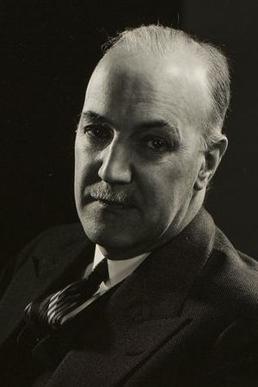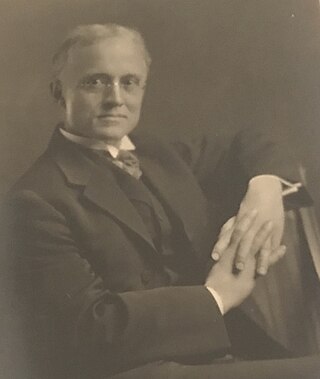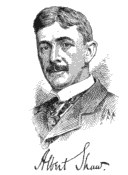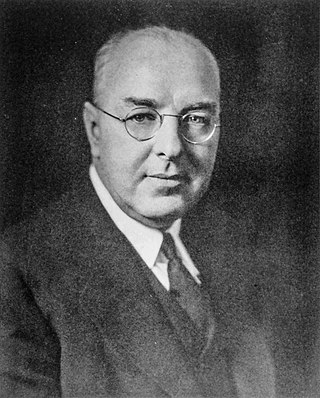Related Research Articles

Alfred North Whitehead was an English mathematician and philosopher. He created the philosophical school known as process philosophy, which has been applied in a wide variety of disciplines, including ecology, theology, education, physics, biology, economics, and psychology.

American Impressionism was a style of painting related to European Impressionism and practiced by American artists in the United States from the mid-nineteenth century through the beginning of the twentieth. The style is characterized by loose brushwork and vivid colors with a wide array of subject matters but focusing on landscapes and upper-class domestic life.
Thomas Andrew Bailey was a professor of history at his alma mater, Stanford University, and wrote many historical monographs on diplomatic history, as well as the widely used American history textbook, The American Pageant. He was known for his witty style and clever terms he coined, such as "international gangsterism." He popularized diplomatic history with his entertaining textbooks and lectures, the presentation style of which followed Ephraim Douglass Adams. Bailey contended foreign policy was significantly affected by public opinion, and that current policymakers could learn from history.

Víctor Andrés Belaúnde Diez Canseco was a Peruvian diplomat, politician, philosopher and scholar. He chaired the 14th Session and the 4th Emergency Special Session of the United Nations General Assembly between 1959 and 1960 and was Minister of Foreign Affairs of Peru in 1958. A distinguished scholar, Belaúnde was an important catholic thinker and a professor at the San Marcos University and then at the Pontifical Catholic University, where he was Emeritus Rector.

Charles Seymour was an American academic, historian and the 15th President of Yale University from 1937 to 1951. As an academic administrator, he was instrumental in establishing Yale's residential college system. His writing focused on the diplomatic history of World War I.

Sir Charles Kingsley Webster was a British diplomat and historian. He was educated at Merchant Taylors' School, Crosby and King's College, Cambridge. After leaving Cambridge University, he went on to become a professor at Harvard, Oxford, and the London School of Economics (LSE). He also served as President of the British Academy from 1950 to 1954.

Isaac Joslin Cox, Ph.D. (1873–1956) was an American professor of history.
Samuel Flagg Bemis was an American historian and biographer. For many years he taught at Yale University. He was also president of the American Historical Association and a specialist in American diplomatic history. He was awarded two Pulitzer Prizes. Jerald A. Combs says he was "the greatest of all historians of early American diplomacy."
Charles Oscar Paullin was an important naval historian, who made a significant early contribution to the administrative history of the United States Navy.

Albert Shaw was an American journalist and academic.

The National Committee on United States China Relations (NCUSCR) is a nonprofit organization and advisory body founded in 1966 to encourage understanding and cooperation between the United States and China. Since 1966, the committee has conducted exchanges, educational, and policy activities in the areas of politics and security, education, governance and civil society, economic cooperation, media, and transnational issues, addressing these topics with respect to Mainland China, Hong Kong, and Taiwan.
Howard Kennedy Beale was an American historian. He had several temporary appointments before becoming a professor of history at the University of North Carolina in 1935. His most famous student was C. Vann Woodward, who adopted the Beard-Beale approach to Reconstruction. He went to the University of Wisconsin in 1948, where he directed many dissertations. He specialized in nineteenth and twentieth-century American history, particularly the Reconstruction Era, and the foreign policy of the early 20th century. He was a noted civil libertarian and advocate for academic freedom.

Henry Merritt Wriston was an American educator, presidential advisor, and served as president at both Brown University and Lawrence University.

Henry Mills Hurd was the first director of the Johns Hopkins Hospital and remained in that post for 22 years (1889–1911) following which he was appointed Secretary to the Board of Trustees (1911–1927). He was also the first Professor of Psychiatry at the medical school from its opening in 1893 until 1905.
Julius William Pratt (1888–1983) was a United States historian who specialized in foreign relations and imperialism. Noted for his studies of the origins of the War of 1812 and the war with Spain in 1898, he also wrote a two-volume biography of Cordell Hull. He was the historian who rediscovered John L. O'Sullivan and his role in originating the idea of Manifest Destiny.

William Clarke Somerville was an author, historian, diplomat, American plantation owner and militia officer in the War of 1812.

Anthony St. John Baker was a British diplomat and Royal Navy officer serving in His Majesty's Foreign Service during England's Regency era.
Henry Carroll was a Colonial lawyer and who served as secretary to Henry Clay, Congressman and a member of the Treaty of Ghent Peace Commission.

Robert K. Brigham is the Shirley Ecker Boskey Professor of History and International Relations at Vassar College. He is a historian of US foreign policy, particularly of the Vietnam War.
The Walter Hines Page School of International Relations was a research institute that was part of Johns Hopkins University in Baltimore, Maryland, United States. It began official operations in 1930, although it had trouble acquiring sufficient funding, and was led at different times by John Van Antwerp MacMurray, Frederick S. Dunn, and Owen Lattimore. The school came to an end in 1953 as part of a university reorganization and possibly also due to Red Scare accusations against Lattimore.
References
- ↑ Back Matter advertisement for John H. Latané, The Diplomatic Relations of the U.S. and Spanish America (Johns Hopkins University Press) in George Ernest Barnett, ed., A Trial Bibliography of American Trade-Union Publications Johns Hopkins University Studies in Historical and Political Science, Series XXII, Nos. 1-2 (Baltimore: Johns Hopkins University Press, 1904): p. xi.
- ↑ Back Matter advertisement for James Morton Callahan, The Diplomatic History of the Southern Confederacy (Johns Hopkins University Press) in George Ernest Barnett, ed., A Trial Bibliography of American Trade-Union Publications, Johns Hopkins University Studies in Historical and Political Science, Series XXII, Nos. 1-2 (Baltimore: Johns Hopkins University Press, 1904): p. xi. p. xi.
- ↑ Published, with additional material, as American Diplomacy under Tyler and Polk (Baltimore: The Johns Hopkins Press, 1907).
- 1 2 3 4 5 Identified in front matter, Henry Merritt Wriston, Executive Agents in American Foreign Relations (Baltimore: Johns Hopkins Press, 1929).
- ↑ Published as British Interests and Activities in Texas, 1838-1846 (Baltimore: The Johns Hopkins Press, 1910).
- ↑ Published as Diplomatic Negotiations of American Naval Officers, 1778-1883 (Baltimore: The Johns Hopkins Press, 1912).
- ↑ Published as The West Florida Controversy, 1798-1813: A Study in American Diplomacy (Baltimore: The Johns Hopkins Press, 1918).
- ↑ Published as Early Diplomatic Relations between the United States and Mexico (Baltimore: The Johns Hopkins Press, 1916).
- ↑ Published as The Early Diplomatic Relations Between the United States and Japan, 1853-1865 (The Johns Hopkins University Press, 1917).
- ↑ "Henry Merritt Wriston (1889-1978)". Archived from the original on October 6, 2013.
- ↑ Published as Pinckney's Treaty: A Study of America's Advantage from Europe's Distress, 1783–1800 (Baltimore: Johns Hopkins University Press, 1926).
- ↑ State Security and the League of Nations (Albert Shaw Lectures on Diplomatic History, 1927). AMS Press. 1973 [1927]. ISBN 978-0404069599.
- ↑ Published as Bolivar and the Political Thought of the Spanish American Revolution (Baltimore: Johns Hopkins University Press, 1938).
- ↑ Published as The Purchase of the Danish West Indies (Baltimore: The Johns Hopkins Press, 1932)
- ↑ Published as American Diplomacy During the World War (Baltimore: Johns Hopkins University Press, 1934).
- 1 2 Johns Hopkins University Circular, Issue 9 (1936): 189.
- ↑ Published as The Monroe Doctrine, 1867-1907 (Baltimore: Johns Hopkins University Press, 1937).
- ↑ "Albert Katz Weinberg". John Simon Guggenheim Memorial Foundation. Archived from the original on June 3, 2013. Retrieved May 31, 2013.
- ↑ Published as The Policy of the United States toward the Neutrals, 1917-1918 (Baltimore: Johns Hopkins University Press, 1942).
- ↑ Henry H. Lesene, A History of the University of South Carolina, (University of South Carolina Press): 10.
- ↑ Published as Theodore Roosevelt and the Rise of America to World Power (Baltimore: Johns Hopkins University Press, 1956).
- ↑ Published as Foreign Policy and the Democratic Process (Baltimore: Johns Hopkins University Press, 1955).
- ↑ Entry for Craig, International Who's Who of Authors and Writers, Vol. 19 (London: Europa Publications, 2003): 119.
- ↑ Published as Britain and the U.S.A. (Baltimore: Johns Hopkins University Press, 1963).
- ↑ Published in revised form as Cultural Internationalism and World Order (Johns Hopkins University Press, 1997).
- ↑ Published as Neu, ed., After Vietnam: Legacies of a Lost War (Baltimore: Johns Hopkins University Press, 2000).